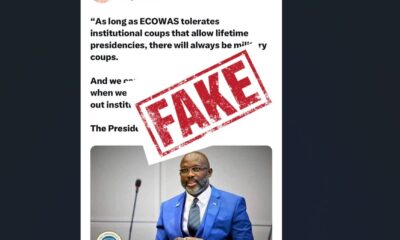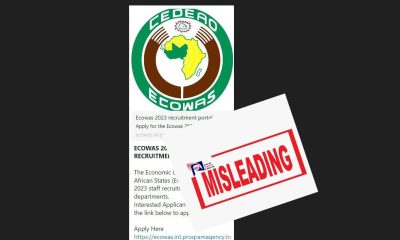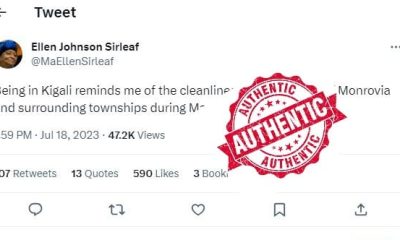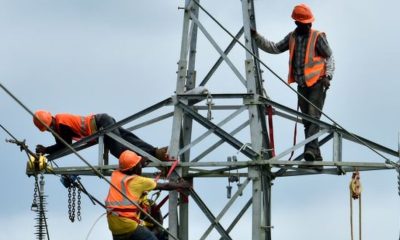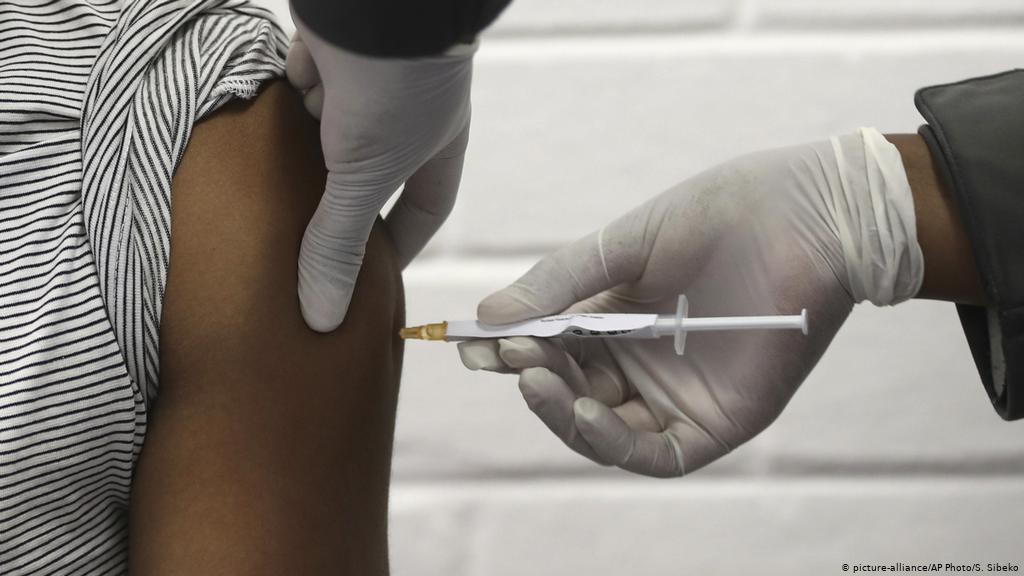
Monrovia — A viral WhatsApp message claiming that anyone who has been vaccinated against COVID-19 is prohibited from taking any anesthetic including local or dentist anesthetics because of the danger it poses, was found to be incorrect.
Report By: Grace Z. Gaie | Local Voices Liberia Fact Checker
According to the National Institute of Health, Anesthesia is a medical treatment that prevents patients from feeling pain during surgery. It allows people to have procedures that lead to healthier and longer lives. Anesthetics achieve this effect by acting on the brain or peripheral nervous system to suppress responses to sensory stimulation. The unresponsive state thus induced is known as anesthesia.
What did we find?
In our research, we found that the US Center for Disease Control and Prevention (CDC) lists Anesthetics amongst several other medical procedures that can be performed during and after COVID-19 Vaccination.
The procedures include Routine blood work, dental procedures, CT scans (also known as CAT scans or computed tomography), with or without IV contrast dye, EKGs (also known as ECGs or electrocardiograms), Cardiac stress tests (also known as exercise tolerance tests or treadmill tests), with or without radiographic dye, Colonoscopies, and Ultrasounds.
Though the CDC advised patients who are due for a mammogram (a machine used for detecting early signs of breast cancer) and have been recently vaccinated for COVID-19, to consult the doctor on how long to wait after vaccination because of some possible swelling in the lymph nodes (lymphadenopathy) in the underarm near where they got the shot for some.
However, the CDC emphasize that the swelling is a normal sign that your body is building protection against COVID-19 and does not pose any risk to your health as insinuated in the claim.
COVID-19 or the vaccine does not interfere with anesthesia
According to American Society of Anesthesiologists, there is no evidence that either COVID-19 or the vaccine interfere with anesthesia. However, because surgery is stressful on the body and temporarily puts extra strain on the immune system, the society advises that one should wait until fully recovered from COVID-19 or fully immunized after vaccination before proceeding with surgery. It is worth noting that this advice does not mean that doing the opposite could take a life away.
The society further notes that one can have essential or elective surgery once you have fully recovered from COVID-19. The ASA recommends that waiting from four weeks (if you had no symptoms or only mild symptoms) to 12 weeks (if you had been admitted to the ICU) to have surgery.
Also, when Local Voices Liberia contacted Dr. Jaya Shreedhar, an Indian doctor who has been working to counter misinformation about the pandemic, she said that “there is absolutely no evidence to suggest that undergoing local or general anesthesia after getting any COVID-19 vaccine is life-threatening”.
That is why vaccine manufacturers have not said that taking anesthesia after getting a COVID-19 vaccine is contra-indicated, she added.
Does Anesthetic drugs affect us after we have been vaccinated with COVID-19 vaccines?
Anesthetic drugs and the trauma caused by surgery, according to Dr. Shreedhar, can influence and lessen the immune response to vaccines — including COVID-19 vaccines.
“By the way, this applies to any immuno-suppressing medication or even basic painkillers such as ibuprofen. This is why researchers are presently studying how immunization, anesthesia, and surgery may all interact and influence each other,” she said.
Dr. Jaya advice that “anesthesia must be timed to ensure that COVID-19 vaccines themselves are fully protective, not because there is a threat of any harm”.
At the same time, the NIH stated that the effects of anesthesia and surgery on the immune response and complications associated with vaccination during the perioperative period are still poorly understood, and opinions are divided.
Previous fact checked reports have rated similar claim about Anesthetic as incorrect because such claim lacks scientific backing.
Conclusion
Based on the evidence made available by the Centers for Disease Control and Prevention, (CDC), the American Society Anesthesiologist (ASA), and the World Health Organization (WHO), it has been found that the claim is incorrect because there is no available scientific evidence to validate it.
| Claim | Verdict |
| Anyone who has been vaccinated against COVID-19 is prohibited from taking any type of Anesthetic, even local anesthetics or dentists Anesthetic because this pose a great danger to the life of the vaccinated person and is highly dangerous.
|
Incorrect. There is no available Scientific Proof to support this claim.
|
Important: If you are experiencing these signs and symptoms go for testing. Wearing mask and vaccines offer good protection against the Delta variant and it is a good way to stay safe and protected.
You may contact us to fact check any claim or information relative to Liberia. Contact us on:
Factcheck.localvoicesliberia@gmail.com or WhatsApp: +231880986778
LVL Fact Checking Desk is part of the Liberia Media Initiative co-financed by the European Union. The funder had no say in the production of this report.
Local Voices Liberia is a network of dedicated Liberian journalists based in the 15 counties working to lift the development concerns and progress of rural communities.


Methodology

True
The claim is rigorous and the content is demonstrably true.

Half True
The statement is correct, although it needs clarification additional information or context.

Unproven
Evidence publicly available neither proves nor disproves the claim. More research is needed.

Misleading
The statement contains correct data, but ignores very important elements or is mixed with incorrect data giving a different, inaccurate or false impression.

False
The claim is inaccurate according to the best evidence publicly available at this time.

Retraction
Upon further investigation of the claim, a different conclusion was determined leading to the removal of the initial determination.

Toxic
A rude, disrespectful, or unreasonable comment that is somewhat likely to make you leave a discussion or give up on sharing your perspective. Based on algorithmic detection of issues around toxicity, obscenity, threats, insults, and hate speech;
